英语单词中常见前缀(prefix)和后缀(suffix)大总结
- 格式:doc
- 大小:44.00 KB
- 文档页数:14
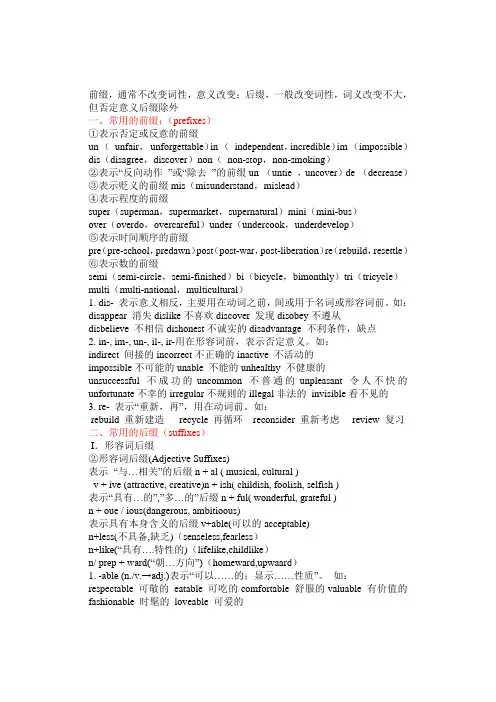
前缀,通常不改变词性,意义改变;后缀,一般改变词性,词义改变不大,但否定意义后缀除外一、常用的前缀:(prefixes)①表示否定或反意的前缀un (unfair,unforgettable)in (independent,incredible)im (impossible)dis(disagree,discover)non(non-stop,non-smoking)②表示“反向动作”或“除去”的前缀un (untie ,uncover)de (decrease)③表示贬义的前缀mis(misunderstand,mislead)④表示程度的前缀super(superman,supermarket,supernatural)mini(mini-bus)over(overdo,overcareful)under(undercook,underdevelop)⑤表示时间顺序的前缀pre(pre-school,predawn)post(post-war,post-liberation)re(rebuild,resettle)⑥表示数的前缀semi(semi-circle,semi-finished)bi(bicycle,bimonthly)tri(tricycle)multi(multi-national,multicultural)1. dis- 表示意义相反,主要用在动词之前,间或用于名词或形容词前。
如:disappear 消失dislike不喜欢 discover 发现disobey不遵从disbelieve 不相信dishonest不诚实的 disadvantage 不利条件,缺点2. in-, im-, un-, il-, ir-用在形容词前,表示否定意义。
如:indirect 间接的incorrect不正确的inactive 不活动的impossible不可能的 unable 不能的 unhealthy 不健康的unsuccessful 不成功的 uncommon不普通的 unpleasant令人不快的unfortunate不幸的 irregular不规则的 illegal非法的 invisible看不见的3. re- 表示“重新,再”,用在动词前。
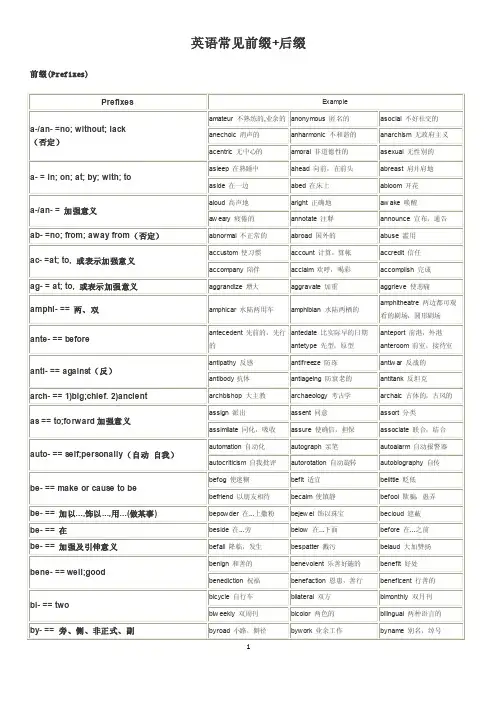
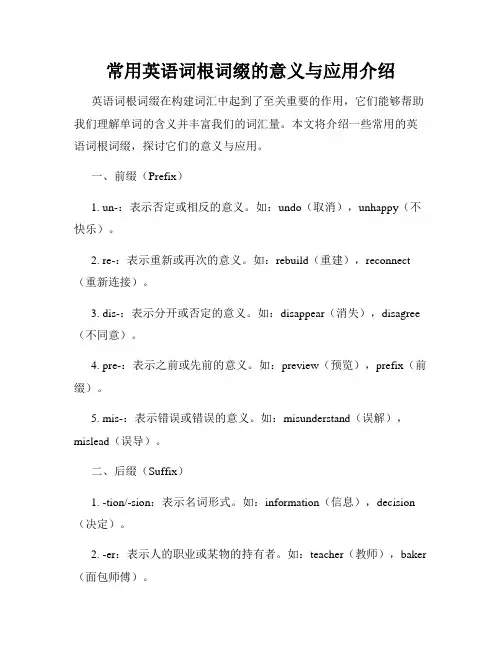
常用英语词根词缀的意义与应用介绍英语词根词缀在构建词汇中起到了至关重要的作用,它们能够帮助我们理解单词的含义并丰富我们的词汇量。
本文将介绍一些常用的英语词根词缀,探讨它们的意义与应用。
一、前缀(Prefix)1. un-:表示否定或相反的意义。
如:undo(取消),unhappy(不快乐)。
2. re-:表示重新或再次的意义。
如:rebuild(重建),reconnect (重新连接)。
3. dis-:表示分开或否定的意义。
如:disappear(消失),disagree (不同意)。
4. pre-:表示之前或先前的意义。
如:preview(预览),prefix(前缀)。
5. mis-:表示错误或错误的意义。
如:misunderstand(误解),mislead(误导)。
二、后缀(Suffix)1. -tion/-sion:表示名词形式。
如:information(信息),decision (决定)。
2. -er:表示人的职业或某物的持有者。
如:teacher(教师),baker (面包师傅)。
3. -able/-ible:表示可以做某事的意义。
如:readable(可读的),compatible(兼容的)。
4. -ment:表示状态或行为的名词形式。
如:enjoyment(享受),agreement(一致)。
5. -ing:表示进行中的动作或状态。
如:running(跑步),sleeping (睡觉)。
三、词根(Root)1. act:表示行动或做某事的意义。
如:active(积极的),react (反应)。
2. bio:表示生命的意义。
如:biology(生物学),biography(传记)。
3. port:表示携带或运输的意义。
如:import(进口),export(出口)。
4. aud:表示听或听觉的意义。
如:audience(观众),audio(音频)。
5. struct:表示建造或组织的意义。
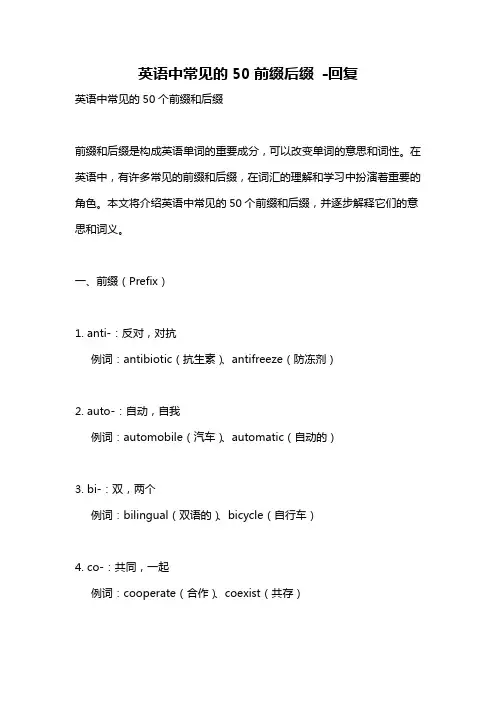
英语中常见的50前缀后缀-回复英语中常见的50个前缀和后缀前缀和后缀是构成英语单词的重要成分,可以改变单词的意思和词性。
在英语中,有许多常见的前缀和后缀,在词汇的理解和学习中扮演着重要的角色。
本文将介绍英语中常见的50个前缀和后缀,并逐步解释它们的意思和词义。
一、前缀(Prefix)1. anti-:反对,对抗例词:antibiotic(抗生素)、antifreeze(防冻剂)2. auto-:自动,自我例词:automobile(汽车)、automatic(自动的)3. bi-:双,两个例词:bilingual(双语的)、bicycle(自行车)4. co-:共同,一起例词:cooperate(合作)、coexist(共存)5. dis-:否定,不例词:disagree(不同意)、dislike(不喜欢)6. ex-:前,以前例词:ex-president(前总统)、ex-boyfriend(前男友)7. fore-:在前,预先例词:foresee(预见)、forehead(前额)8. in-:不,非例词:impossible(不可能的)、incorrect(不正确的)9. micro-:微小的例词:microscope(显微镜)、microorganism(微生物)10. multi-:多,多个例词:multimedia(多媒体)、multipurpose(多用途)11. non-:非,不例词:nonstop(不停的)、nonsense(胡说)12. pre-:前,之前例词:preorder(预订)、precaution(预防)13. re-:重新,再次例词:rebuild(重建)、replay(重新播放)14. semi-:半,一半例词:semicircle(半圆)、semicolon(分号)15. un-:不,非例词:unhappy(不快乐的)、unusual(不寻常的)二、后缀(Suffix)1. -able/-ible:能够,可以例词:comfortable(舒适的)、flexible(灵活的)2. -al:形容词的例词:emotional(情绪的)、rational(理性的)3. -ed:过去式的,被动的例词:finished(完成的)、loved(被爱的)4. -er/-or:名词形式,。
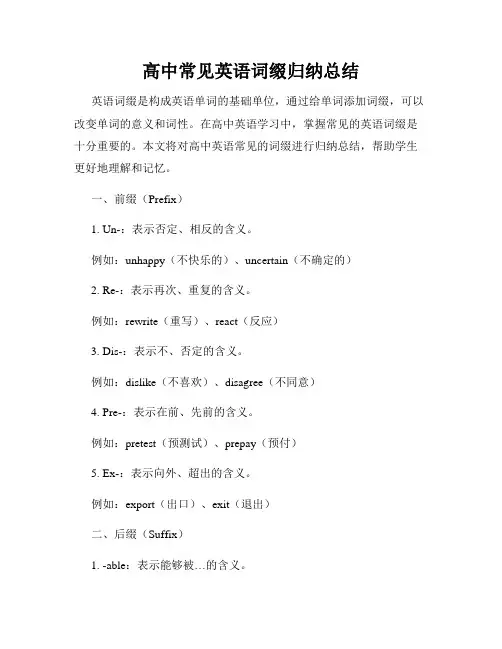
高中常见英语词缀归纳总结英语词缀是构成英语单词的基础单位,通过给单词添加词缀,可以改变单词的意义和词性。
在高中英语学习中,掌握常见的英语词缀是十分重要的。
本文将对高中英语常见的词缀进行归纳总结,帮助学生更好地理解和记忆。
一、前缀(Prefix)1. Un-:表示否定、相反的含义。
例如:unhappy(不快乐的)、uncertain(不确定的)2. Re-:表示再次、重复的含义。
例如:rewrite(重写)、react(反应)3. Dis-:表示不、否定的含义。
例如:dislike(不喜欢)、disagree(不同意)4. Pre-:表示在前、先前的含义。
例如:pretest(预测试)、prepay(预付)5. Ex-:表示向外、超出的含义。
例如:export(出口)、exit(退出)二、后缀(Suffix)1. -able:表示能够被…的含义。
例如:comfortable(舒适的)、readable(可读的)2. -ful:表示充满的含义。
例如:grateful(感激的)、beautiful(美丽的)3. -less:表示无的含义。
例如:useless(无用的)、hopeless(无望的)4. -ion:表示某种行为、状态或结果。
例如:celebration(庆祝)、discussion(讨论)5. -ment:表示某种状态、行为。
例如:achievement(成就)、movement(运动)三、词根(Root)1. Bio-:表示生命的含义。
例如:biology(生物学)、biography(传记)2. Tele-:表示远、远程的含义。
例如:television(电视)、telephone(电话)3. Auto-:表示自动、自发的含义。
例如:automatic(自动的)、autobiography(自传)4. Multi-:表示多的含义。
例如:multimedia(多媒体)、multiply(乘)5. Photo-:表示光的含义。
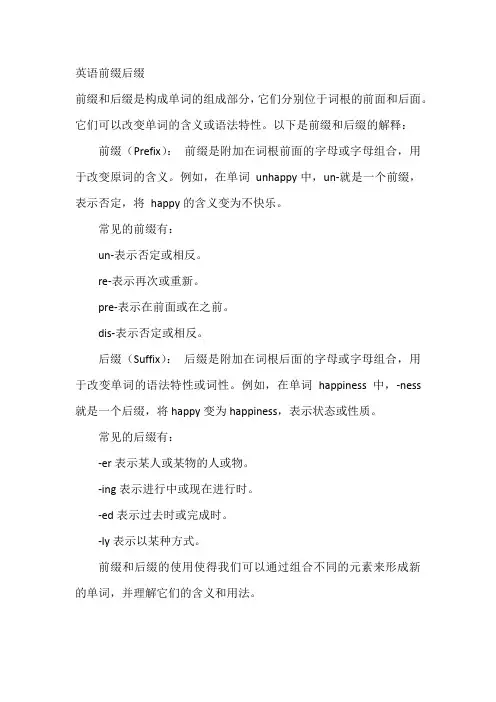
英语前缀后缀
前缀和后缀是构成单词的组成部分,它们分别位于词根的前面和后面。
它们可以改变单词的含义或语法特性。
以下是前缀和后缀的解释:前缀(Prefix):前缀是附加在词根前面的字母或字母组合,用于改变原词的含义。
例如,在单词unhappy中,un-就是一个前缀,表示否定,将happy的含义变为不快乐。
常见的前缀有:
un-表示否定或相反。
re-表示再次或重新。
pre-表示在前面或在之前。
dis-表示否定或相反。
后缀(Suffix):后缀是附加在词根后面的字母或字母组合,用于改变单词的语法特性或词性。
例如,在单词happiness中,-ness 就是一个后缀,将happy变为happiness,表示状态或性质。
常见的后缀有:
-er表示某人或某物的人或物。
-ing表示进行中或现在进行时。
-ed表示过去时或完成时。
-ly表示以某种方式。
前缀和后缀的使用使得我们可以通过组合不同的元素来形成新的单词,并理解它们的含义和用法。
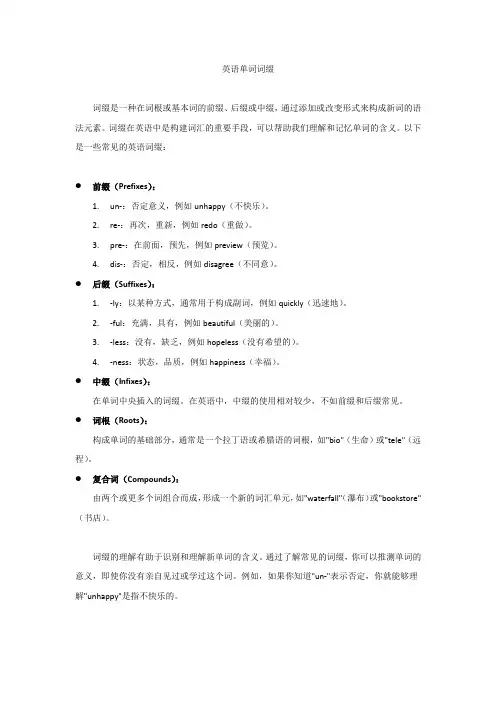
英语单词词缀词缀是一种在词根或基本词的前缀、后缀或中缀,通过添加或改变形式来构成新词的语法元素。
词缀在英语中是构建词汇的重要手段,可以帮助我们理解和记忆单词的含义。
以下是一些常见的英语词缀:●前缀(Prefixes):1.un-:否定意义,例如unhappy(不快乐)。
2.re-:再次,重新,例如redo(重做)。
3.pre-:在前面,预先,例如preview(预览)。
4.dis-:否定,相反,例如disagree(不同意)。
●后缀(Suffixes):1.-ly:以某种方式,通常用于构成副词,例如quickly(迅速地)。
2.-ful:充满,具有,例如beautiful(美丽的)。
3.-less:没有,缺乏,例如hopeless(没有希望的)。
4.-ness:状态,品质,例如happiness(幸福)。
●中缀(Infixes):在单词中央插入的词缀。
在英语中,中缀的使用相对较少,不如前缀和后缀常见。
●词根(Roots):构成单词的基础部分,通常是一个拉丁语或希腊语的词根,如"bio"(生命)或"tele"(远程)。
●复合词(Compounds):由两个或更多个词组合而成,形成一个新的词汇单元,如"waterfall"(瀑布)或"bookstore"(书店)。
词缀的理解有助于识别和理解新单词的含义。
通过了解常见的词缀,你可以推测单词的意义,即使你没有亲自见过或学过这个词。
例如,如果你知道"un-"表示否定,你就能够理解"unhappy"是指不快乐的。
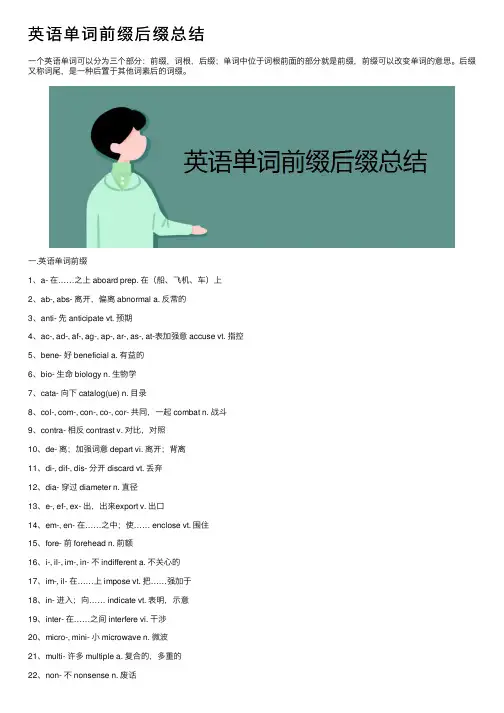
英语单词前缀后缀总结⼀个英语单词可以分为三个部分:前缀,词根,后缀;单词中位于词根前⾯的部分就是前缀,前缀可以改变单词的意思。
后缀⼜称词尾,是⼀种后置于其他词素后的词缀。
⼀.英语单词前缀1、a- 在……之上 aboard prep. 在(船、飞机、车)上2、ab-, abs- 离开,偏离 abnormal a. 反常的3、anti- 先 anticipate vt. 预期4、ac-, ad-, af-, ag-, ap-, ar-, as-, at-表加强意 accuse vt. 指控5、bene- 好 beneficial a. 有益的6、bio- ⽣命 biology n. ⽣物学7、cata- 向下 catalog(ue) n. ⽬录8、col-, com-, con-, co-, cor- 共同,⼀起 combat n. 战⽃9、contra- 相反 contrast v. 对⽐,对照10、de- 离;加强词意 depart vi. 离开;背离11、di-, dif-, dis- 分开 discard vt. 丢弃12、dia- 穿过 diameter n. 直径13、e-, ef-, ex- 出,出来export v. 出⼝14、em-, en- 在……之中;使…… enclose vt. 围住15、fore- 前 forehead n. 前额16、i-, il-, im-, in- 不 indifferent a. 不关⼼的17、im-, il- 在……上 impose vt. 把……强加于18、in- 进⼊;向…… indicate vt. 表明,⽰意19、inter- 在……之间 interfere vi. ⼲涉20、micro-, mini- ⼩ microwave n. 微波21、multi- 许多 multiple a. 复合的,多重的22、non- 不 nonsense n. 废话23、ob-, op- 相反 oppose vt. 反对24、out- 向外,出来 outlet n. 出⼝25、over- 越过 overlook vt. 忽视26、per- 穿过 perspective n. 视⾓27、pre- 在…之前 pregnant a. 怀孕的28、pro- 向前 promote vt. 促进29、re- 向后;再次 recall vt. 回忆起30、semi- 半 semiconductor n. 半导体31、sub- 在……下 subway n. 地铁32、super- 在……之上,超级的 superior a. 优于……的33、trans- 横过,越过 transplant vt. 移栽34、tri- 三 triangle n. 三⾓35、twi- 表⽰⼆、两36、un- 不 uncover vt. 揭露37、under- 在……下⾯,低于…… underline vt. 在……下⾯划线38、uni- ⼀个 unique a. 唯⼀的,独特的39、vice- 表⽰副40、with- 表⽰向后,相反⼆、英语单词后缀1、动词后缀:-ate,-en, -(i)fy, -ish, -ize/ise2、副词后缀:-ly,-ward(s), -way(s)3、形容词后缀:-able/ible,-al/ial,-full, -ic, -ish, -ive, -ly4、名词后缀:-ability,-acity,-ain,-aire,-ance,-ation,-dom,-ence,-eer,-ine,-kin5、表⽰“⼈”的名词后缀:-ist,-man, -er/or, -ee, -ant6、表⽰“⼩”的名词后缀:-el,-let, -(c)ule7、抽象名词后缀:-ion,-hood, -ic(s), -ism, -ship, -ty。
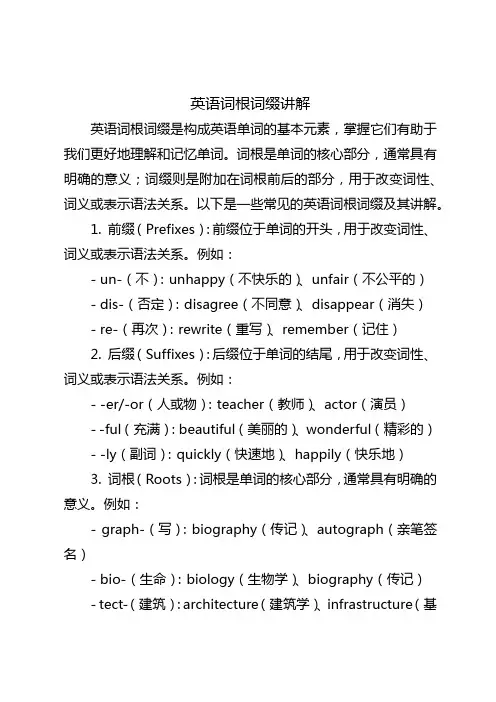
英语词根词缀讲解英语词根词缀是构成英语单词的基本元素,掌握它们有助于我们更好地理解和记忆单词。
词根是单词的核心部分,通常具有明确的意义;词缀则是附加在词根前后的部分,用于改变词性、词义或表示语法关系。
以下是一些常见的英语词根词缀及其讲解。
1. 前缀(Prefixes):前缀位于单词的开头,用于改变词性、词义或表示语法关系。
例如:- un-(不):unhappy(不快乐的)、unfair(不公平的)- dis-(否定):disagree(不同意)、disappear(消失)- re-(再次):rewrite(重写)、remember(记住)2. 后缀(Suffixes):后缀位于单词的结尾,用于改变词性、词义或表示语法关系。
例如:- -er/-or(人或物):teacher(教师)、actor(演员)- -ful(充满):beautiful(美丽的)、wonderful(精彩的)- -ly(副词):quickly(快速地)、happily(快乐地)3. 词根(Roots):词根是单词的核心部分,通常具有明确的意义。
例如:- graph-(写):biography(传记)、autograph(亲笔签名)- bio-(生命):biology(生物学)、biography(传记)- tect-(建筑):architecture(建筑学)、infrastructure(基础设施)4. 组合词根(Compound Roots):由两个或多个词根组成的词根。
例如:- tele-(远程):telephone(电话)、television(电视)- auto-(自动):automobile(汽车)、automatic(自动的)5. 转化词根(Fused Roots):由两个词根融合而成的词根。
例如:- pneumo-(空气):pneumonia(肺炎)、pneumatic(气动的)- psycho-(心灵):psychology(心理学)、psychiatry(精神病学)6. 派生词缀(Derivational Affixes):用于派生出新词的词缀。
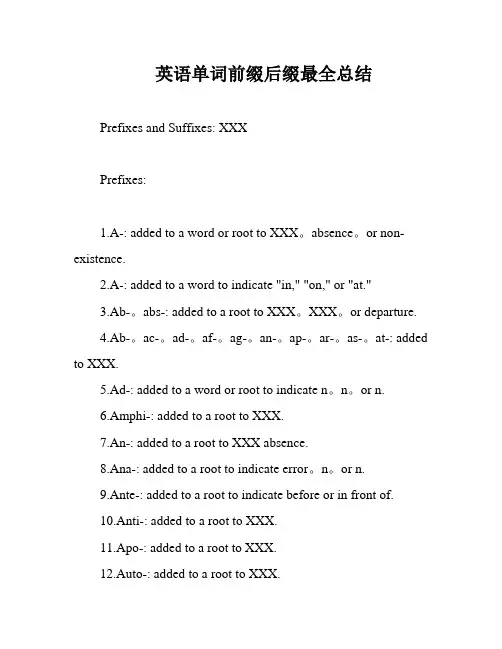
英语单词前缀后缀最全总结Prefixes and Suffixes: XXXPrefixes:1.A-: added to a word or root to XXX。
absence。
or non-existence.2.A-: added to a word to indicate "in," "on," or "at."3.Ab-。
abs-: added to a root to XXX。
XXX。
or departure.4.Ab-。
ac-。
ad-。
af-。
ag-。
an-。
ap-。
ar-。
as-。
at-: added to XXX.5.Ad-: added to a word or root to indicate n。
n。
or n.6.Amphi-: added to a root to XXX.7.An-: added to a root to XXX absence.8.Ana-: added to a root to indicate error。
n。
or n.9.Ante-: added to a root to indicate before or in front of.10.Anti-: added to a root to XXX.11.Apo-: added to a root to XXX.12.Auto-: added to a root to XXX.Suffixes:13.-Be: added to a root to form a verb indicating XXX.14.-Be: added to a root to form some ns.15.-XXX: added to a root to XXX kindness.16.-Bi: added to a root to XXX.17.-By: added to a root to XXX.18.-XXX: added to a root to indicate down。
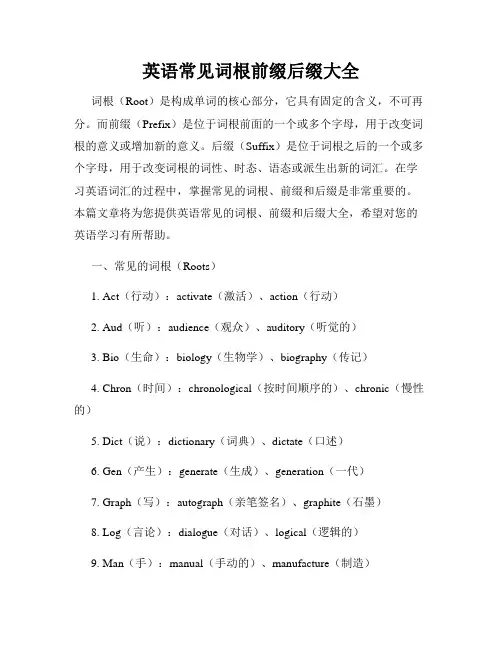
英语常见词根前缀后缀大全词根(Root)是构成单词的核心部分,它具有固定的含义,不可再分。
而前缀(Prefix)是位于词根前面的一个或多个字母,用于改变词根的意义或增加新的意义。
后缀(Suffix)是位于词根之后的一个或多个字母,用于改变词根的词性、时态、语态或派生出新的词汇。
在学习英语词汇的过程中,掌握常见的词根、前缀和后缀是非常重要的。
本篇文章将为您提供英语常见的词根、前缀和后缀大全,希望对您的英语学习有所帮助。
一、常见的词根(Roots)1. Act(行动):activate(激活)、action(行动)2. Aud(听):audience(观众)、auditory(听觉的)3. Bio(生命):biology(生物学)、biography(传记)4. Chron(时间):chronological(按时间顺序的)、chronic(慢性的)5. Dict(说):dictionary(词典)、dictate(口述)6. Gen(产生):generate(生成)、generation(一代)7. Graph(写):autograph(亲笔签名)、graphite(石墨)8. Log(言论):dialogue(对话)、logical(逻辑的)9. Man(手):manual(手动的)、manufacture(制造)10. Port(搬运):transport(运输)、porter(搬运工)二、常见的前缀(Prefixes)1. Un-:unhappy(不快乐的)、uncertain(不确定的)2. Re-:return(返回)、rewrite(改写)3. Dis-:dislike(不喜欢)、disagree(不同意)4. Mis-:misunderstand(误解)、misbehave(行为不端)5. In-:inactive(不活跃的)、incomplete(不完整的)6. Over-:overcome(克服)、overwhelm(压倒)7. Pre-:preview(预览)、preheat(预热)8. Post-:postpone(推迟)、postgraduate(研究生)9. Multi-:multicultural(多元文化的)、multimedia(多媒体的)10. Ex-:excite(激动)、exhaust(耗尽)三、常见的后缀(Suffixes)1. -able:comfortable(舒适的)、reachable(可达到的)2. -ful:beautiful(美丽的)、helpful(有帮助的)3. -er:teacher(教师)、writer(作家)4. -ing:running(跑步的)、reading(阅读的)5. -less:useless(无用的)、meaningless(无意义的)6. -ment:development(发展)、enjoyment(享受)7. -tion:education(教育)、communication(交流)8. -sion:explosion(爆炸)、conclusion(结论)9. -ly:quickly(快速地)、carefully(谨慎地)10. -ness:happiness(快乐)、kindness(善良)通过掌握英语常见的词根、前缀和后缀,我们可以更好地理解单词的构成和意义,扩大自己的词汇量。
常见的英语前缀和后缀
以下是一些常见的英语前缀(prefix)和后缀(suffix):
前缀(Prefixes):
1.Un-:表示否定或相反,如unhappy(不快乐的)、undo(撤销)。
2.Re-:表示重新或再次,如rewrite(重写)、rethink(重新考虑)。
3.Pre-:表示在前面或提前,如preview(预览)、preheat(预热)。
4.Mis-:表示错误或误解,如misunderstand(误解)、misbehave(行为不当)。
5.Dis-:表示分开或离开,如disconnect(断开连接)、disappear(消失)。
6.Over-:表示过度或超过,如overwhelm(压倒)、overcome(克服)。
后缀(Suffixes):
1.-er/-or:表示人或物的职业或身份,如teacher(教师)、actor(演员)。
2.-ing:表示进行中的动作,如running(跑步)、reading(阅读)。
3.-ed:表示过去式或完成状态,如played(玩过)、finished(完成的)。
4.-able/-ible:表示可以被做或发生的,如comfortable(舒适的)、visible(可见的)。
5.-tion/-sion:表示名词,如information(信息)、decision(决定)。
6.-ly:表示副词,如quickly(快速地)、happily(快乐地)。
这些是一些常见的英语前缀和后缀,掌握它们可以帮助我们更好地理解和构建英语单词。
当然,还有许多其他的前缀和后缀,具体使用会根据单词的含义和语境而有所变化。
1。
英文前缀后缀总结I. Prefixes:2. Anti-: The prefix "anti-" means "against" or "opposite of." It is used to indicate opposition or hostility. For example, "antibiotic" means against bacteria, "antiviral" means against viruses, and "antisocial" means opposed to social behavior.3. Dis-: The prefix "dis-" means "not" or "opposite of." Itis used to give a negative or reversing meaning to a word. For example, "dislike" means not liking, "dishonest" means not honest, and "disagree" means not agreeing.4. Ex-: The prefix "ex-" means "out" or "out of." It is used to indicate a former or previous status. For example, "ex-wife" means a former wife, "ex-president" means a former president,and "exodus" means a mass departure.5. Un-: The prefix "un-" means "not" or "opposite of." It is used to give a negative meaning to a word. For example, "unhappy" means not happy, "unthinkable" means not able to be thought, and "unfair" means not fair.II. Suffixes:1. -able/-ible: The suffixes "-able" and "-ible" mean "capable of" or "worth." They are used to form adjectives. For example, "admirable" means worthy of admiration, "flexible"means capable of bending, and "visible" means capable of being seen.2. -er/-or: The suffixes "-er" and "-or" denote a person or thing that performs an action or holds a specific position. For example, "teacher" means a person who teaches, "actor" means a person who acts, and "doctor" means a person who heals.3. -ing: The suffix "-ing" is used to form present participles, gerunds, and verbal nouns. It indicates the progressive aspect, ongoing action, or state. For example, "running" refers to the act of running, "amazing" describes something that amazes, and "painting" denotes the action of painting.4. -ity/-ty: The suffixes "-ity" and "-ty" are used to form abstract nouns that denote a certain quality or state. For example, "creativity" means the quality of being creative, "integrity" means the state of having moral principles, and "diversity" means the condition of being diverse.5. -ment: The suffix "-ment" is used to form nouns from verbs and indicates the action or product of an action. For example, "development" means the act or process of developing, "fulfillment" means the act of fulfilling, and "enjoyment" means the state of enjoying.III. Other Examples:2. -less: The suffix "-less" means "without" or "lacking." It is used to form adjectives that describe the absence or lack of something. For example, "homeless" means without a home, "useless" means lacking usefulness, and "speechless" means without speech.4. -ful: The suffix "-ful" means "characterized by" or "full of." It is used to form adjectives that describe the presence or abundance of something. For example, "grateful" means characterized by gratitude, "playful" means full of playfulness, and "helpful" means full of help.5. -ism: The suffix "-ism" is used to form nouns that denotea doctrine, system, or belief. For example, "capitalism" denotes the economic system characterized by private ownership and profit, "feminism" denotes the advocacy of women's rights, and "racism" denotes the belief in the superiority of one race over others.。
英语单词常见前后缀总结1.前缀:- un-: 表示"不"或"否定",例如:unhappy(不快乐),unfair(不公平)- re-: 表示"再一次"或"重新",例如:rewrite(重写),replay (重新播放)- pre-: 表示"之前"或"预先",例如:prepaid(预付的),preheat (预热)- dis-: 表示"相反"或"分离",例如:dislike(不喜欢),disconnect(断开连接)- mis-: 表示"错误"或"不正确",例如:misunderstand(误解),misbehave(行为不当)2.后缀:- -ly: 表示"以...的方式"或"具有..."的性质,例如:quickly(快速地),happily(快乐地)- -ful: 表示"具有..."或"充满...",例如:peaceful(和平的),thankful(感激的)- -ment: 表示"行为"或"状态",例如:agreement(协议),achievement(成就)- -ist: 表示"从事..."或"专家",例如:artist(艺术家),scientist(科学家)3.前缀和后缀的组合:- un- + -able: 表示"无法...",例如:unforgettable(难以忘怀的),unbreakable(不可破坏的)- re- + -ment: 表示"再一次的行为"或"重新...",例如:replacement(更换),reinvestment(重新投资)- pre- + -ful: 表示"先前的..."或"预先充满...",例如:prejudice(偏见),precautionful(慎重的)需要注意的是,虽然这其中有一些常见前后缀的意义是固定的,但有些前后缀的意义可能会根据具体词语的上下文而有所改变。
英语常用前缀后缀第一篇:英语常用前缀后缀前缀(prefix)一.分表示否定的前缀1.dis-加在名词、形容词,动词之前。
disadvantage(缺点)dishonorable(不光彩的)disagree(不同意)2.in-加在形容词,名词之前incorrect(不正确的),inability(无能,无力),inaccurate (不准确的)3.im-加在字母m,b,p之前impossible(不顺能的),impolite(不礼貌的),impudence (厚颜无耻)4.il-加在以1开头的词前illegal(非法的),illiterate(文盲的,无文化的)illogical(不合逻辑的)5.ir-加在以r开头的词前irregular(不稳定的),irresistable(不可抵抗的),irresolvable(不能分解的,不能解决的)6.un-加在名词,形容词,副词之前unfinished(未完成的)undoubted(无疑的)unemployment (失业)7.non-加在形容词,名词前non-existence(不存在),non-essential(不主要的),non-electrical(非电的)8.mis-加在动词、名词之前misunderstand(误解),misjudge(误判),misleading(误导),misfortune(不幸)9.dis-加地动词之前disappear(消失),disarm(解除武装),disconnect(失去联系)10.de-加在名词,形容词之前demobilize(遣散;使…复员)decolor(脱色, 漂白)11.anti-加在名词、形容词之前anti-Japanese(抗日战争),anti-social(厌恶社会的,反社会的),antidite(解毒药)12.counter-加在名词、动词前counterattack(反攻,反击),counteract(抵抗,阻碍)counterrevolution(反革命)13.dis-(常指一分为多):display 展览,陈列(dis-分着,play-播放、展示,分着展示——展览,陈列)14.se-(常指一分为二);separate 分开(se-分,par=pair-一对、一双,把一对儿分开——分开,隔离)二.共表示“共同”、“和”的前缀1.Co--coexist(共存),cooperate(合作),coeducation(男女同校)2.com-(还有con/cor/col的版本)compose 组成,构成(com-共同,pose-摆放,往共同的地方摆放——组成、构成)connect 联系(con-共同,nect=neck-脖子,相同的脖子,拥有同一个脖子的——连接、联系)correct 正确的(cor-全都,rect-直立、直立着,全都是直立的——正确的)collect 收集,收藏(col-全都,lect-挑选,全挑过来,全选过来——收集、收藏、集中)3.per--具体指:“每一个”或者“一直”的意思person人(per-每一个,son-儿子,人是上帝的每一个儿子,每个人也都是上帝之子)perfect 完美的(per-每一个,fect-做,制造,每一件事都做了——完美的)三.表示“前before”的前缀1.pre----preconception(成见),pre-exsiting(先于……而存在的),pre-selection(选举前的)preface(前言)preface封面(pre-前,face-脸、面,在前面的脸——封面)2.ante--anteroom(前室,接待室),antecessor(先行者,先驱者)3.fore---forehaed(前额),foreground(前景),foreman (工头,领班),foresee(预见,先见),foretell(预言)4.pro----programme(计划),prologue(序幕)progress 前进,进步(pro-往前,gress-前进,往前前进——前进,进步)5.ex-----ex-president(前任总统)ex-wife(前妻)四.表示“后-post”的前缀1.post----post-war(战后),post-position(后置词),postmeridian(下午)五.下:表示“低”、“下”的前缀1.hypo--Hypocrisy(伪善,虚伪),hypothesis(假设),pypocholoride(次氯酸盐)2.Infra--Infra-red(红外线),infrahuman(低于人类的),infrasonic(亚声的,次声的)3.Sub---(常指往...下)Subeditou(副编辑),sub-way(地铁),sub-conscious(下意识的),submarine---(海下的),subtropical(亚热带的),subtitle(副标题)4.de----(常指在...下);delay 延迟、耽误(de-底下,lay-放,往底下放——延迟,耽误)六.表示“回”、“再次”、“向后”的前缀1.re----(有反复、返回两个意思)Refuel(给…加油),retranslate(再译),reinforce(加强),reconstruct(重建),return返回(re-往回,turn-转,往回转——返回)2.retro-Retrograde(倒退的),retrospect(回顾)3.op---(相对的)oppose对抗(op-相对,pose-摆放——在相对的位置摆放——对抗)七.表示“相互”、“之间”的前缀1.Inter---Interchangeble(可互换的),interdipendert(互相依靠的),international(国际的),inter-national(交往)八.上表示“出”、“超出”表示“超过”的前缀1.Ec------Eclipse(蚀),ecstasy(狂想)2.Extra--Extraordinary(非凡的),extramural(校外的),extrasensory(超感觉的)3.sur-----surpass 超过,超越(sur-超,pass过——超过、超越)4.hyper-hyper-sensitive(过敏的)5.preter-preterhuman(超人的)6.super-, 7.ultra-九.内:1.ac---accept 接受(ac-往里,cept-拿、取,往里面拿——接受)2.in---常指在...里inside 在里面(in-在里,side-边、侧)3.im---import 进口(im-进入,port-港口)4.il----illuminate 照明(il-进入,lumin-词根:光,ate-动词后缀,进入灯光——照明)十.外:--,;1.ex--exit 出口、门(ex-往外,it-后缀,往外出的地方——出口、门)2.e e---lect 选举(e-往外,lect-挑选,往外挑选出来——选举)3.es---essay 散文、随笔(es-往外,say-说,随口而说——散文,随笔)十一.其它的前缀1.auto----自automatic(自动的),auto-autobilgraphy (自传)2.mal-----坏,恶 Malnutrition(营养不良),maltreat(虐待)3.Micro--Microscope(显微镜),microtome(切片机)4.Tele----远Telegram(电报),telephone(电话),telescope(望远镜)5.Demi---,semi-hemi-Semi-circle(半圆),hemisphere(半球),demilune(半月,新月)6.Uni----mono-(单一, 单独)Monotone(单调),monologue(独白),uniform(制服)7.bi-di------二Biyearly(二年一次的),biweekly(二周一次的),dichloride(二氯化物)8.Tri-------三 Triangle(三角),tripld(三角架)9.Multi-----多multi-colored(颜色多样的),multi-national (多国的)10.Poly –多 Polygon(多角形),polytomic(多原子的)11.Arch -首领 archbishop(大主教),architect(建筑师)12.bene----善,好 benefit(利益),benevolence(善意)13.homo---同homosexual(同性恋的),homograph(同形异义字)14.Neo----新 neo-colonialism(新殖民主义),neolithic(新石器时代的)15.ortho---正确,直orthogonal(直角的),orthodox(正统)16.philo----挚爱 philosopher(哲学家)17.proto---原始protohydrogen(初氢),prototype(原型),protoplasm(原生质)18.pseudo-假的, 伪的, 冒充的pseudonym(匿名),pseudo-communism(假共产主义)19.a-,ab-,abs-(只有在t,c之前)从,自avoid(避免),absent(缺少的),abstain(抑制),abstract(吸引)20.Apo----,aph-来自apology(道歉,谢罪),apostle(倡言者,先驱)21.se-------分离separation(分开),secure(安全的),sedition(煽动叛乱)22.para-----防parachute(降落伞),23.omni-----所有的,公共的 omnibus(公共汽车),omnipotence(万能)24.pan-------全,泛Pan-American(全美的),pancean (万灵药),panorama(风景的全貌;万花筒)25.panto---全pantisocracy(乌托邦大同世界),pantoscopic(视野广大)26.dia-----通过,借以diagonal(对角的),diagnosis(诊断),dialogue(对话)27.Per-----通过,彻底,不利perambrlate(走来走去),perfect极好的28.trans---通过,横过transcript(抄本, 副本;记录),translation(翻译),trxnsparent(透明的),transport(运输),trans-plant(移植)29.Com-,con-,cor-,col-共同,和,完全comment(评论),compile(编辑),correlation(相互关系),collect(收集),corruption(贪污腐败),collaborate(合作,合著)30.syn----共同synonym(同义词),synchronization(同步),syntonic(谐振的),synthetic(人工的,合成的)31.meta----和,在……之后metaphor(比喻),metaphysics(形而上学)32.Cis-----在这一边 cisatlantic(大西洋这边的)33.pen-----几乎,相近peninsular(.住在半岛上的居民,半岛(状)的, 形成半岛的)34.en-,em--往……里,使…… encamp(扎营),enable(使……能),endear(使……受喜爱),embrace(拥抱,抓住(机会))35.Intro---内在intracardiac(心脏内部的),intramolecular (分子内部的),intracelular(细胞内部的)36.intro---到……中introduce(介绍),introspect(反省,内省)37.dys-----坏 dyspepsia(消化不良),dysentry(痢疾)38.Eu------优,美好 eulogy(颂词),euphony(悦耳的声音)39.ambi-,amphi-两者amphibian(两栖的),ambidextrous (两只手都很灵巧的;心怀二意的;非常灵巧的)40.penta----五pentagon(五角大楼),pentagram(五角星),pentameter(五步诗句)41.sex------六 sexangle(六角),sexennial(六年一度的)42.sept-----七September九月(古罗马的七月),septennial(七年一度)43.hepta----七heptab(七个成套之物),heptagon(七角形)44.octa-,octo,oct八octagon(八角形),octuple(八倍)October(十月)45.nona-,ennea-九nonagon(九角形),ennead (九个一组)46.deci-,deca-十 decimal(十进位的),decagramme(十克)47.centi-----百 centimeter(厘米),centipede(蜈蚣)48.milli-----千 millenias(千年的),millimeter(毫米)49.Kilo-----千 kilowatt(千瓦),kilometer(千米)后缀(Suffixes)一、名词后缀 1.表示“人”的后缀(1)具有某种职业的人①-ian加在以-c或-y结尾的形容词或名词后,如:electric → electrician电工physic → physician 内科医生technical → technician技术员music → musician 音乐家magic → magician 魔术师library → librarian 图书管理员comedy → comedian 喜剧演员history → historian 历史学家②-erplumber 水管工人banker 银行家carpenter 木匠(2)支持或信奉……的人,……主义者-ist terror 恐怖→ terrorist 恐怖主义者social 社会的→ socialist 社会主义者extreme极端→ extremist 极端主义者-arian humanity 人道→ humanitarian 人道主义者 vegetable 蔬菜→ vegetarian 素食主义者authority权力→ authoritarian 权力主义者(3)做某事的人-arbeggar乞丐liar撒谎者-arymissionary传教士secretary秘书-atecandidate候选人advocate 倡导者-atornarrator 叙述者mediator 调停人-istnovelist小说家dentist 牙医-eervolunteer志愿者mountaineer 登山运动员-erteacherwriter-orinventorauthor-eeexaminee考生trainee接受培训者interviewee接受面谈者;被接见者(4)表示感情色彩-y(人或小东西,有喜爱和亲昵的含义)fatty胖子doggy小狗狗kitty(=pussy)小猫咪piggy(=piglet)小猪pony小马-ster(常含有贬义,做…事情的人,是…样的人)game 游戏→ gamester 赌徒gang 一伙→ gangster 匪徒trick 诡计→ trickster 骗子rhyme 韵律→ rhymester 作诗者,打油诗人(5)表示阴性-ess goddess女神hostess女主人2.抽象名词的后缀(1)学科-ic,-ics logic逻辑学rhetoric修辞学dynamics动力学acoustics声学astronautics航天学-ology …学biology 生物学geology地质学psychology 心理学hydrology水文学 3.表示工具和物质名称-al(物品或事物名称)manual手册pictorial画报editorial社论journal日记,期刊-er(用于做某事的物品或工具)cooker厨具lawnmower割草机dishwasher洗碗机propeller推进器fertilizer化肥-ery 物品总称machinery机器jewellery珠宝crockery陶器(=china)cutlery刀具 4.带有“小”含义的名词-enkitten小猫chicken小鸡-ettecigarette香烟-lingduckling小鸭-letbooklet小册子(pamphlet)-cleparticle 微粒 5.抽象名词后缀(1)性质、状态、情况-ance,-ancy(-ant结尾的形容词对应的名词)constant始终如一的→ constancypregnant怀孕的→ pregnancy elegant优雅的→ elegancy/elegance redundant多余的→ redundancy/redundance-ance,-ancy 附着在动词后面构成名词disturb打扰→ disturbanceforbear忍受→ forbearance resemble像→ resemblance相像ascend上升→ ascendancy优势地位-ence,-ency(-ent结尾的形容词对应的名词)dependent依靠→ dependenceprudent谨慎→ prudence fluent流利的→ fluencyefficient有效率的→ efficiency complacent自满的→ complacency-ability(以-able结尾的形容词)capable有能力的→ capability能力reliable可靠的→ reliability 可靠性-ibility(以-ible结尾的形容词)possible可能的→ possibility可能性compatible兼容的→ compatibility兼容性Feasible可行的→ feasibility 可行性flexible灵活的→flexibility 灵活性-ness 附着在形容词后面dark → darkness黑暗friendly → friendliness 亲切;友善empty → emptiness 空虚kind → kindness仁慈(2)行为、动作的后果-alapproval批准refusal拒绝arrival到达survival幸存-ion,-sion,-tionunion联合 expansion扩张collection 收集-mentpunishment惩罚management管理embodiment 体现;化身-ureexposure暴露legislature立法机关(3)表示抽象概念-shipfriendship友谊dictatorship独裁hardship艰辛leadership领导-thwarmth温暖depth深度length长度breadth宽度width宽度-tudeaptitude天资gratitude感激altitude海拔latitude纬度longitude经度(4)-ism表示学说、信仰、主义Confucius孔子→ Confucian(a.儒家的n.儒家弟子)→ Confucianism儒家思想 socialism 社会主义capitalism资本主义materialism 唯物主义extremism极端主义(5)-ship 关系、身份fellow伙伴→ fellowship伙伴关系kin亲戚→kinship亲属关系member → membership会员资格author → authorship作者身份citizen → citizenship公民身份二、动词后缀1.使成为,造成,…化-en(加在名词或形容词前面或后面)使……成为…名词前:encourage鼓励encode加密enforce执行entitle给…题名endanger 危及名词后:lengthen延长strengthen加强threaten威胁frighten吓唬形容词前:enlarge 扩大/放大enable使能够enrich丰富ensure确保形容词后:broaden/widen拓展;扩宽quicken加快deepen加深-fysimplify简化beautify美化purify净化-ate(对应的名词通常是-ation)originate起源concentrate 集中circulate环绕-ish nourish滋养diminish变小flourish繁荣polish擦亮vanish消失impoverish使穷困-ize(-ise见于英国英语)popularize使普及modernize使现代化globalize使全球化industrialize 使工业化 2.反复动作、连续动作-erwander徘徊chatter喋喋不休waver来回摆动 3.拟声动作-shcrash撞击splash 飞溅crush压碎三、形容词后缀 1.可的,易于…的-ablemovable可移动的inflammable 易燃的changeable多变的useable可用的-iblesensible 可感觉到的flexible灵活的extensible 可伸展的resistible 可抵挡的-ilemobile可移动的 fragile易碎的volatile易挥发的 2.如…的;似…的;…形状的-ishchildish 孩子气的;幼稚的sluggish如懒汉的;不景气的snobbish势利的-like childlike孩子般天真的dreamlike如梦的manlike男子似的,有男子气质的-yicy似冰的wooly羊毛状的silky丝一样的 silvery似银的sissy女人气的-lysaintly圣人般的cowardly懦弱的 scholarly有学者风度的;博学的3.有…的;多…的-edcolored彩色的gifted/ talented有才能的experienced有经验的limited有限的-ywindy/rainy/cloudy/snowystarry繁星满天的 wordy啰嗦的worthy有价值的-fulpowerful强有力的hopeful抱有希望的fruitful多产的harmful 有害的grateful感激的-ous courageous有勇气的mountainous多山的 poisonous 有毒的 prosperous 繁荣的 4.属于…的;与…有关的-al emotional感情的professional职业的regional地区的;局部的global全球的-an urban城市的surburban郊区的metropolitan 大都市的-ar solar太阳的lunar月亮的polar极地的-icatomic原子的electronic电子的metallic金属的(区分:historic/historicaleconomic/economical)-ual habitual习惯上的spiritual精神上的intellectual智力的individual个人的-ialpresidential总统的 commercial商业的 racial 种族的 5.具有…性质的-antignorant愚昧的luxuriant奢华的 resistant抵抗的-arsimilar相似的 familiar 熟悉的peculiar特殊的-aryelementary基本的imaginary想象的momentary片刻的honorary荣誉的-atefortunate幸运的considerate 考虑周到的;体贴的passionate 充满激情的-ative talkative健谈的comparative比较的conservative 保守的affirmative肯定的-ficscientific科学的horrific可怕的specific具体的-idvivid生动的candid率直的splendid辉煌的-iousrebellious反叛的 spacious宽敞的-itivesensitive敏感的competitive竞争的 primitive原始的-icalperiodical周期的typical典型的 historical历史的 6.其它-ing 使…的;正在…的 surprisingdeveloping-ed 已…的;受…的 retirededucated(比较:surprising/surprised;disappointing/disappointed;embarrassing/ embarrassed;pleasing/ pleased;exciting/excited)-less 无…的to save the helpless, homeless, hopeless, hapless-proof防…的;不透…的waterproof防水的airproof 不透气的-ly worldly世俗的orderly有条理的 timely及时的-orycontradictory 矛盾的compulsory 强制性的 transitory短暂的-sometroublesome麻烦的burdensome沉重的 boresome烦人的四、副词后缀1.表示方式、方法、状态、…地-ably(以-able结尾的形容词对应的副词形式)respectable → respectably 可尊敬地;体面地comfortable → comfortably 舒适地-ibly(以-ible结尾的形容词对应的副词形式)possible → possibly 可能地;也许sensible → sensibly 合情理地-ly(一般加在形容词后面,就原意构成副词)carefully/courageously 注意:(1)–ic结尾的形容词变成副词时变成-ically,极少数词除外economic → economically 经济上地specific → specifically 具体地dramatic → dramatically 戏剧性地;剧烈地(2)少数形容词变成副词后意义发生变化hardly几乎不shortly不久 2.表示方向-ward forward 向前backward向后upward向上downward向下-wise clockwise顺时针方向sidewise 斜向一边地第二篇:考研英语前缀后缀(一)必记前缀链接Aa-“ 不,无,非”asocial a 缺乏社交性的● a-“在…,…的” asleep a 睡着的aside▲ a 在边上 alive a 活的alone a.单独的,孤独的 ad.单独地,独自地;仅仅aloud adv.出声地,大声地awake a.醒着的 vt.唤醒,使觉醒 vi.醒来,醒悟到 ab-“离开,加强意义” absent a 缺席的absence n.缺乏,不存在;缺席,不在;缺席的时间absurd a.荒谬的,荒诞的,荒唐可笑的;不合理的ab-,ac-,ad-,af-,ag-,an-,ap-,ar-,as-,at-“一再” 表强调,加强意义。
初中英语词缀归纳总结英语词缀是构成英语单词的基本元素之一,它们可以改变单词的词性、含义以及语法功能。
在初中英语词汇学习中,了解和掌握常见的词缀对于提高词汇量和理解词汇的构成有着重要的作用。
本文将对初中英语中常见的几种词缀进行归纳总结。
一、前缀(Prefix)前缀是在单词的开头加上的一种词缀,它可以改变单词的意思或者词性。
以下是初中英语常见的前缀:1. un-:表示否定、相反,如unhappy(不开心的)、uncertain(不确定的)。
2. re-:表示重新或再次,如return(返回)、rewrite(重写)。
3. dis-:表示不、否定,如dislike(不喜欢)、disagree(不同意)。
4. pre-:表示在前、之前,如pretest(预测)、preview(预览)。
二、后缀(Suffix)后缀是在单词的结尾加上的一种词缀,它可以改变单词的意思、词性或者形态。
以下是初中英语常见的后缀:1. -ful:表示充满、有...特征的,如beautiful(美丽的)、careful(小心的)。
2. -less:表示没有、缺乏,如hopeless(绝望的)、useless(无用的)。
3. -er:表示人或物的职业、身份,如teacher(教师)、writer(作家)。
4. -able:表示能够、有能力的,如comfortable(舒适的)、understandable(可理解的)。
三、词根(Root)词根是单词中最基本、最核心的部分,它能够表达一个单词的基本意思。
了解常见的词根有助于我们理解和记忆单词。
以下是一些常见的词根及其意思:1. bio-:表示生命,如biology(生物学)、biography(传记)。
2. tele-:表示远程、远距离,如television(电视)、telephone(电话)。
3. aud-:表示听、听觉,如audio(音频)、audience(观众)。
4. graph-:表示写、描述,如graphite(石墨)、graphic(图表)。
构词法是指单词形成的方式,英语中有多种构词法。
以下是英语中常见的10种构词法:
1. 前缀(Prefix):
- 通过在词根前添加字母或音节来改变词义,比如un(不)re(再次)等。
2. 后缀(Suffix):
- 通过在词根后添加字母或音节来改变词性或词义,比如-ly(副词后缀)、-able(形容词后缀)等。
3. 派生(Derivation):
- 通过改变词的词根或加入前缀和后缀来形成新词,比如从名词natio 派生而来的形容词national。
4. 复合词(Compound words):
- 由两个或多个词组合而成,保留各自的词义,如sunflower(太阳花)。
5. 缩略词(Abbreviations):
- 由一个或多个词的首字母组成,如UN(联合国)、radar(雷达)。
6. 混成词(Blending):
- 将两个词的部分合并而成,如brunch(早午餐)。
7. 借词(Borrowing):
- 从其他语言中借用的词,如pizza(比萨饼)来自意大利语。
8. 转化(Conversion):
- 通过改变词的词性而形成新词,如将名词email转化为动词to email(发电子邮件)。
9. 派生缩写词(Back-formation):
- 通过删除词中看似后缀的部分,形成新的词,如editor 衍生出edit。
10. 词根词缀组合(Root and Affix Combination):
- 通过词根和词缀的组合形成新词,比如happiness(幸福)中的happy"是词根,-ness 是后缀。
英语单词中常见前缀(prefix)和后缀(suffix)大总结英语单词中常见前缀(prefix)和后缀(suffix)大总结★ 1.表示否定意义的前缀1) 纯否定前缀a-, an-, asymmetry(不对称), asexual, amoraldis- dishonest, dislikein-, ig-, il-, im-, ir-, incapable, inability, ignoble, impossible, immoral, illegal, irregularne-, n-, none, neither, nevernon-, nonsenseneg-, neglectun- unable, unemployment2)表示错误的意义male-, mal- malfunction, maladjustment(失调,不适应) mis- mistake, mislead, misunderstandingpseudo- pseudonym(假名), pseudoscience3)表示相反动作的意思de- defend , decomposedis- disarm, disconnectun-, unload, uncover4)表示相反,相互对立意思anti-, ant- antiknock( 防震), antiforeign,(排外的) contra-, contre-, contro-, contradictioncounter-, counterreaction, counterbalanceob-, oc-, of-, op- object, oppose, occupywith- withdraw, withstand★ 2. 表示空间位置,方向关系的前缀1)a- 表示“在……之上”,“向……”aboard, aside,2)by- 表示“附近,邻近,边侧”bypath, bypass(弯路)3)circum-, circu-, 表示“周围,环绕,回转”circumstance, circus4)de-, 表示“在下,向下”descend, degrade5)en-, 表示“在内,进入”encage, encamp6)ex-, ec-, es-, 表示“外部,外”exit, expand, export7)extra-, 表示“额外”extraction (提取)8)fore- 表示“在前面”forehead, foreground9)in-, il-, im-, ir-, 表示“向内,在内,背于”inland, invade, inside, import10)inter-, intel-, 表示“在……间,相互”international, interaction, Internet11)intro-, 表示“向内,在内,内侧”introduce, introvert12)medi-, med-, mid-, 表示“中,中间”Mediterranean medieval13)out-, 表示“在上面,在外部,在外”outline, outside, outward14)over-, 表示“在上面,在外部,向上”overlook, overhead, overboard15)post-, 表示"向后,在后边,次”postscript(附言),16)pre-, 表示"在前”在前面”prefix, preface, preposition17)pro-, 表示“在前,向前”progress, proceed,18)sub-, suc-, suf-, sug-, sum-, sup-, sur-, sus-, 表示“在下面,下”subway, submarine, suffix, suppress, supplement19)super-, sur-, 表示“在…..之上”superficial, surface, superstructureh21)under-, 表示“在…..下面,下的”underline, underground, underwater22)up-, 表示“向上,向上面,在上”upward, uphold, uphill(上坡)★ 3. 表示时间,序列关系的前缀1)ante-, anti-, 表示“先前,早于,预先”antecedent, anticipate,2)ex-, 表示“先,故,旧”ex-president, ex-husband3)fore-, 表示“在前面,先前,前面”foreward, forecast, foretell(预言)4)mid-, medi-, 表示“中,中间”midnight, midsummer5)post-"表示“在后,后”postwar,6)pre-, pri-, 表示“在前,事先,预先”preheat, prewar, prehistory7)pro-, 表示“在前,先,前”prologue(序幕),prophet(预言家)8)re-, 表示“再一次,重新”retell, rewrite★ 4. 表示比较程度差别关系的前缀1)by-, 表示“副,次要的”byproduct, bywork(副业)2)extra-,表示“超越,额外”extraordinary,3)hyper- 表示“超过,极度”hypersonic(超声波), hypertension(高血压)4)out-,表示“超过,过分”outdo(超过), outbid(出价过高的人)5)over-,表示“超过,过度,太”overeat, overdress, oversleep6) sub-, suc-, sur-, 表示“低,次,副,亚”subeditor, subordinate, subtropical(亚热带)7)super-, sur- 表示“超过”supernature, superpower, surplus, surpass8)under-,表示“低劣,低下”undersize, undergrown, underproduction(生产不足)9)vice- 表示“副,次”vice-president, vice-chairman★ 5. 表示共同,相等意思的前缀1)com-, cop-, con-, cor-, co- 表示“共同,一起”。
connect, combine, collect, combat, coexist, cooperate2)syn-, syl-,sym-,表示“同,共,和,类”symmetry, sympathy, synthesis(合成)★ 6. 表示整个完全意思的前缀1)al- 表示“完整,完全”alone, almost,2) over-表示“完全,全”overall, overflow(充满)3) pan-表示“全,总,万” Pan-American★ 7. 表示分离,离开意思的前缀1)a- ab-, abs-,表示“分离,离开” away, apart, abstract, abstain2)de- 表示“离去,处去”depart, decolour,3)dis-, di-, dif-, 表示“分离,离开” divorce, disarm(缴械)4)ex-, e-, 表示“离开,分离”expel, exclude, expatriate(驱出国外)5)for- 表示“离开,脱离”f orget, forgive6)se 表示“分离,隔离”separate, seduce, select★ 8. 表示通过,遍及意思的前缀1)dia-,表示“通过,横过”diameter, diagram,2)per-, pel-, 表示“通,总,遍”perfect, perform, pervade(浸透)3)trans-, 表示“横过,贯通”transparent, transmit, transport ★ 9. 表示加强意思的前缀a-, arouse, ashamedad-, adjoin, adhere( 粘着)★ 10. 表示变换词类作用的前缀be-, befriend,en-, enslave, enable, enrichad-, ac-, af-, ag-, an-, ap-, ar-, as-, at-, adapt, accord, affix, aggression, arrive, assist, attend, attract, arrange, assign(委派)★ 11. 表示数量关系的前缀1)表示“单一”,“一”mon-, mon-, monotone(单调),monotonous, monopoly, monarchuni-, un-, uniform, unicellular(单细胞)2)表示“二,两,双”ambi-, ambiguous, amphibian(两栖类)bi-, bin- bicycledi-, diode(二级管),twi-, twilight3)表示“十”deca, deco-, dec-, deci- decade, decimal4)表示"百,百分子一"hecto-, hect-, hectometer,centi-, centimeter5)表示"千,千分子一” kilo-, kilometer6)表示"万,万分子一”myria-, myri-, myriametremega-, meg-, megabytemicro-, microscope7)表示"许多,复,多数”multi-, mult-, multipmetre (万用表)poly-, polysyllable,8)表示“半,一半”hemi-, hemispheresemi-, semiconductor, semitransparentpene-, pen- peninsula★ 12. 表示特殊意义的前缀1)arch-, 表示“首位,第一的,主要的”architect, archbishop,arch-rival2)auto-, 表示“自己,独立,自动”automobile, autobiography3)bene-, 表示“善,福” benefit4)eu-, 表示“优,美好” eulogize5)male-, mal- 表示“恶,不良” maltre atment6)macro-, 表示“大,宏大” macroscopic(宏观的)7)magni-, 表示“大” magnificent8)micro-, 表示“微” microscope★ 13. 表示术语的前缀1)bio-, 表示“生命,生物”biography(传记)2)ge-, 表示“地球,大地”geography3)phon-, 表示“声,音调” telephone4)tele-, 表示“远离”televisionC) 常见的后缀(suffix)★ 1. 名词后缀(1) 具有某种职业或动作的人1)-an, -ian, 表示"……地方的人,精通……的人” American, historian2)-al, 表示"具有……职务的人" principal,3)-ant,-ent 表示"……者” merchant, agent, servant, student4)-ar 表示"……的人” scholar, liar, peddler5)-ard, -art 表示"做……的人”coward, laggard, braggart(夸张者)6)-arian 表示"……派别的人,……主义的人”humanitarian, vegetarian7)-ary 表示"从事……的人" secretary, missionary8)-ate 表示"具有……职责的人" candidate, graduate9)-ator 表示"做……的人" educator, speculator(投机者)10)-crat 表示"某种政体,主义的支持者" democrat, bureaucrat11)-ee 表示"动作承受者" employee, examinee12)-eer 表示"从事于……人" engineer, volunteer13)-er 表示"从事某种职业的人, 某地区,地方的人" banker, observer, Londoner, villager14)-ese 表示" ……国人,…..地方的人”Japanese, Cantonese15)-ess 表示"阴性人称名词, actress, hostess, manageress16)-eur 表示"……家” amateur17)-ian 表示"……地方人,信仰…….教的人,从事……职业的人”Christian, physician(内科医生),musician18)-ician 表示"精通者,……家,”electrician, magician, technician19)-icist 表示"……家,…….者, …….能手”physicist20)-ic 表示"……者,……师" mechanic, critic21)-ie 表示"爱,指小" auntie22)-ier 表示"从事……职业” cavalier, clothier23)-ine, ian 表示"阴性人称" heroine, ballerina24)-ist 表示"从事……研究者,信仰……主义者" pianist, communist, dentist, artist, chemist, violinist25)-ive 表示"动作者,行为者” native, captive26)-logist 表示"……学家,研究者" biologist, geologist(地质学家)27)-or 表示"……者" author, doctor, operator,28)-ster 表示"做…….事情的人”youngster, gamester(赌徒),songster29)-yer 表示" 从事……职业者” lawyer★ (2). 构成,具有抽象名词的含义1)-acy, 表示"性质,状态,境遇" accuracy, diplomacy2)-age, 表示"状态,行为,身份及其结果,总称" courage, storage, marriage3)-al,a) 表示"事物的动作,过程”refusal, arrival, survival, denial, approvalb) 表示具体的事物 manual, signal, editorial, journal4)-ance, -ence表示"性质,状况,行为,过程,总量,程度” endurance, importance, diligence, difference, obedience5)-ancy, -ency, 表示"性质,状态,行为,过程" frequency, urgency, efficiency,6)-bility, 表示"动作,性质,状态" possibility, feasibility,7)-craft, 表示"工艺,技巧” woodcraft, handicraft8)-cracy, 表示"统治,支配" bureaucracy, democracy9)-cy, 表示"性质,状态,职位,级别" bankruptcy(破产),supremacy10)-dom, 表示"等级,领域,状态" freedom, kingdom, wisdom11)-ery, -ry, 表示"行为,状态,习性" bravery, bribery, rivalry12)-ety, 表示"性质,状态” variety13)-faction, -facture, 表示"作成,……化,作用" satisfaction, manufacture14)-hood, 表示"资格,身份, 年纪,状态" childhood, manhood, falsehood15)-ice, 表示"行为,性质,状态" notice, justice, service16)-ine, 表示"带有抽象概念" medicine, discipline, famine17)-ing, 表示"动作的过程,结果" building, writing, learning18)-ion, -sion, -tion, -ation, -ition, 表示"行为的过程,结果,状况" action, solution, conclusion, destruction, expression, correction19)-ise, 表示"性质,状态” exercise, merchan dise20)-ism, 表示"制度,主义,学说,信仰,行为" socialism, criticism, colloquialism, heroism21)-ity, 表示"性质,状态,程度” purity, reality, ability, calamity22)-ment, 表示"行为,状态,过程,手段及其结果 treatment, movement, judgment, punishment, argument23)-mony, 表示"动作的结果,状态" ceremony, testimony24)-ness, 表示"性质,状态,程度" goodness, kindness, tiredness, friendliness25)-or, -our, 表示"动作,性质,状态" favor, error26)-osity, 表示"动作,状态” curiosity27)-shipa) 表示技艺,技能,…法,…术horsemanship, penmanship , salesmanship, huntsmanship , workmanshipb)表示情况,状态,关系,性质friendship , scholarship , hardship, partnership, comradeship , dictatorshipc)表示身份,职位,资格citizenship, kingship , membership, heirship, rulership, professorship, managership , doctorship28)-th, 表示"动作,性质,过程,状态" depth, wealth, truth, length, growth29)-tude, 表示"性质,状态,程度" latitude, altitude(海拔)30)-ure, 表示"行为,结果" exposure, pressure, failure, procedure(手续),31)-y, 表示"行为的结果,状态,性质” glory, history, victory, inquiry★ (3) 带有场所,地方的含义1)-age, 表示"住所,地点" village, cottage2)-ary, 表示"住所,场地" library, granary (谷仓)3)-ery, ry, 表示"工作场所,饲养所,地点" laundry, nursery, surgery(手术室,外科)4)-ory, 表示"场所,住处" factory, dormitory, laboratory, observatory★ (4) 带有学术,科技含义1)-grapy, 表示"……学,写法” biography, calligraphy, geography2)-ic, ics, 表示"……学……法" logic, mechanics, optics, electronics3)-ology, 表示"……学科……论”biology, zoology, technology, genealogy(家谱), ecology , geology, physiology, meteorology (气象学) ,biology, psychology , geography, theology4)-nomy, 表示"……学……术" astronomy, economy5)-ery,-ry 表示"学科,技术" chemistry, cookery, machinery6)-y, 表示"……学,术,法” photography, philosophy★ (5) 表示人和事物的总和,集合含义1)-age, baggage, tonnage2)-dom, newspaperdom (新闻界, 报界), kingdom3)-hood, neighbourhood, womanhood4)-ry, cavalry, ministry(内阁)5)-ure, legislature, judicature★ (6) 表示物品和物质名称的含义1)-ant, -ent solvent, constant2)-al signal, pictorial(画报)3)-ar collar, pillar(柱子)4)- er boiler, computer, washer, cooker5)-ing clothing6)-ment instrument, equipment, attachment★ (7) 表示“细小”的含义1)-cle, particle,2)-cule, molecule(分子)3)-el, parcel4)-en, chicken, maiden5)-et, pocket, ticket6)-etta, -ette, etto, cigarette7)-kin, napkin8)-ling, duckling,9)-let, booklet10)-y, baby, doggy■ 2. 形容词后缀★ (1)带有“属性,倾向,相关”的含义1)-able, -ible movable, comfortable, applicable, visible, responsible2)-al natural, additional, educational3)-an urban, suburban, republican4)-ant, -ent distant, important, excellent5)-ar similar, popular, regular6)-ary military, voluntary7)-ic, -atic, ical systematic, historic, physical,8)-ine masculine, feminine, marine9)-ing moving, touching, daring10)-ish foolish, bookish, selfish11)-ive active ,impressive, decisive12)-ory satisfactory, compulsory13)-il, -ile, -eel fragile★ (2) 表示“相象,类似”的含义1)-ish boyish, childish2)-esque picturesque3)-like manlike, childlike4)-ly manly, fatherly, scholarly, motherly5)-some troublesome, handsome6)-y milky, pasty★ (3) 表示“充分的”含义1)-ful, beautiful, wonderful, helpful, truthful2)-ous, dangerous, generous, courageous, various3)-ent, violent,★ (4) 表示由某种物质形成,制成或生产的含义1)-en, wooden, golden, woolen2)-ous, gaseous3)-fic, scientific★ (5)表示方向的含义1)-ern, eastern, western2)-ward, downward, forward★ (6) 表示“倍数”的含义1)-ble, double, treble2)-ple, triple3)-fold, twofold, tenfold★ (7) 表示“数量关系”的含义1)-teen, thirteen2)-ty, fifty3)-th, fourth, fiftieth★ (8) 表示国籍,语种,宗教的含义1)-an, Roman, European2)-ese, Chinese, Vietnamese, Japanese3)-ish, English, Spanish★ (9) 表示“比较程度”的含义1)-er, greater2)-ish, reddish, yellowish3)-est, highest4)-most, foremost, topmost★ (10) 表示否定-less, countless, stainless, wireless★ (11) 表示“防…的”-proof burglarproof fireproof windproof airproof waterproof rainproof bulletproof■ 3. 动词后缀1)-ize, ise, 表示"做成,变成,…化“modernize, mechanize, democratize, organize2)-en, 表示"使成为,引起,使有” quicken, weaken, soften, harden,enable, darken, widen, broaden3)-fy, 表示"使…化, 使成…”beautify, purify, intensify, signify, simplify4)-ish, 表示"使,令” finish, abolish, diminish, establish5)-ate, 表示“成为……,处理,作用” separate, operate,indicate■ 4. 副词后缀1)-ly, possibly, swiftly, simply2)-ward, -wards, downward, inwards, upward3)-ways, always, sideways4)-wise, otherwise, clockwise。